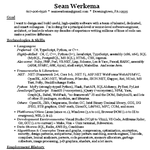There are a few posts on Reddit about this that I just had to give direct replies to.
I always thought lisp was a platonic form
Lisp is not really a “platonic form,” although really what should be argued is the number of operators required for Turing-completeness. Lambda calculus could make a better claim to something like that, although it’s a Turing tarpit. Lisp had a certain degree of elegance by being able to describe its own evaluation using seven fundamental operators (or five, or six, or eight, or whatever, depending on who you talk to). But you can define a Turing-complete language using a single operator. Even the simplest Lisp is a lot bigger. Smile has about a dozen fundamental operators (and its unique parsing/translation layer): That core is not as small as McCarthy’s Lisp, but it’s not exactly a gallumphing dirigible either. That said, of that, only six or seven of those operators are truly necessary; you can write a simple but working eval function for Smile in Smile with just that much, and one of the sample programs I’ll include is exactly that.
I suggest Sean release the language specification and let alternative implementations begin.
Doesn’t there have to be a first implementation before there can be alternative ones? I’d like to get the formal language specification nailed to the floor and etched in stone — and build good conformance tests — before really thinking about alternative implementations. When I’m done squishing bugs in the interpreter, and I have enough documentation that people can learn Smile and become comfortable coding in it, that’s when it’s time to start talking about alternative (faster) implementations. Right now is just too early.
That said, the current interpreter has the Apache open-source license stamped all over its source code. You will be able to get your hands on it from stem to stern, optimize it, clone it, and rebuild it to your heart’s content — when it’s ready for the general public, which it definitely isn’t yet.
> Actually Smile code is very similar to Rebol however it’s exponentially more powerful
> what does that mean?
I don’t know either.
